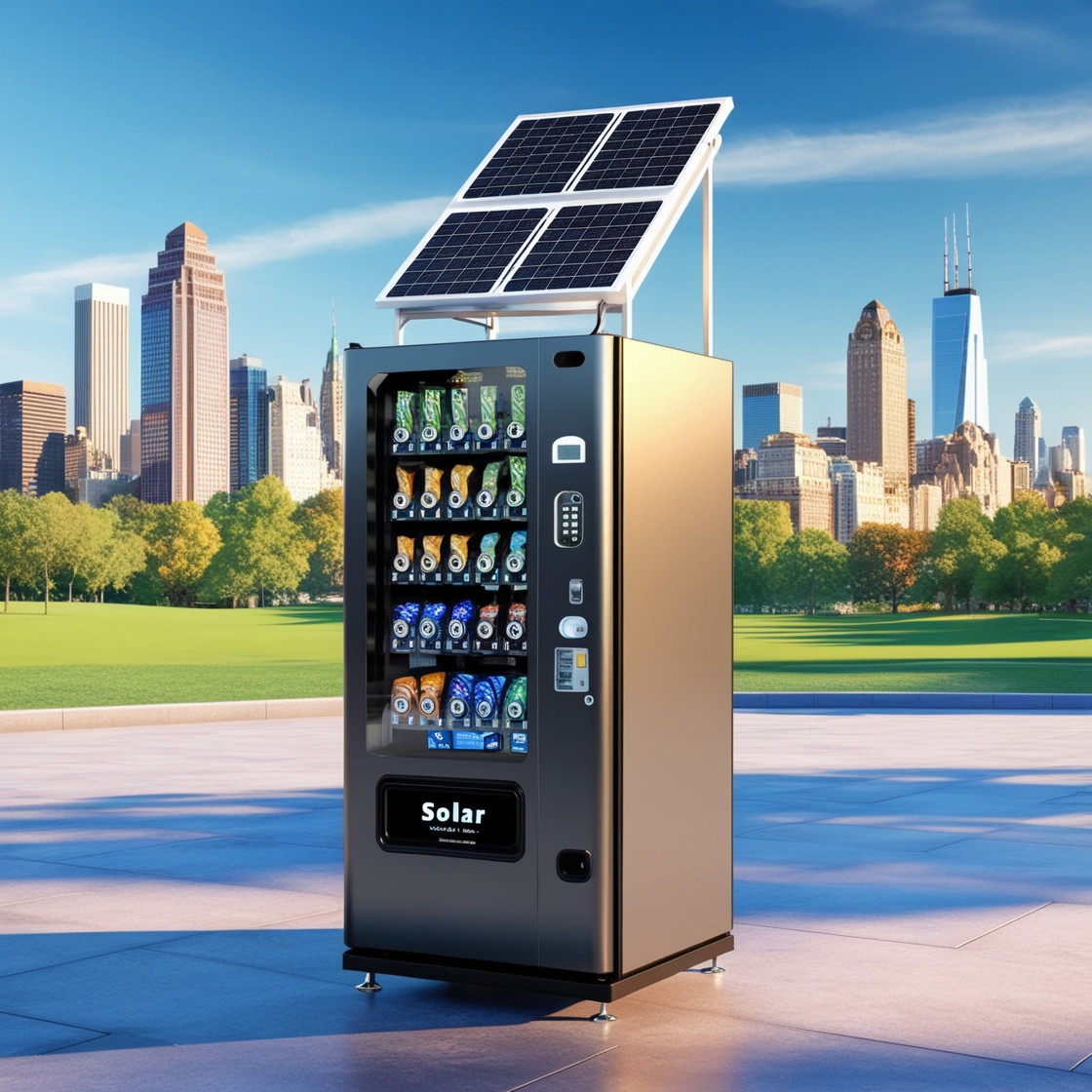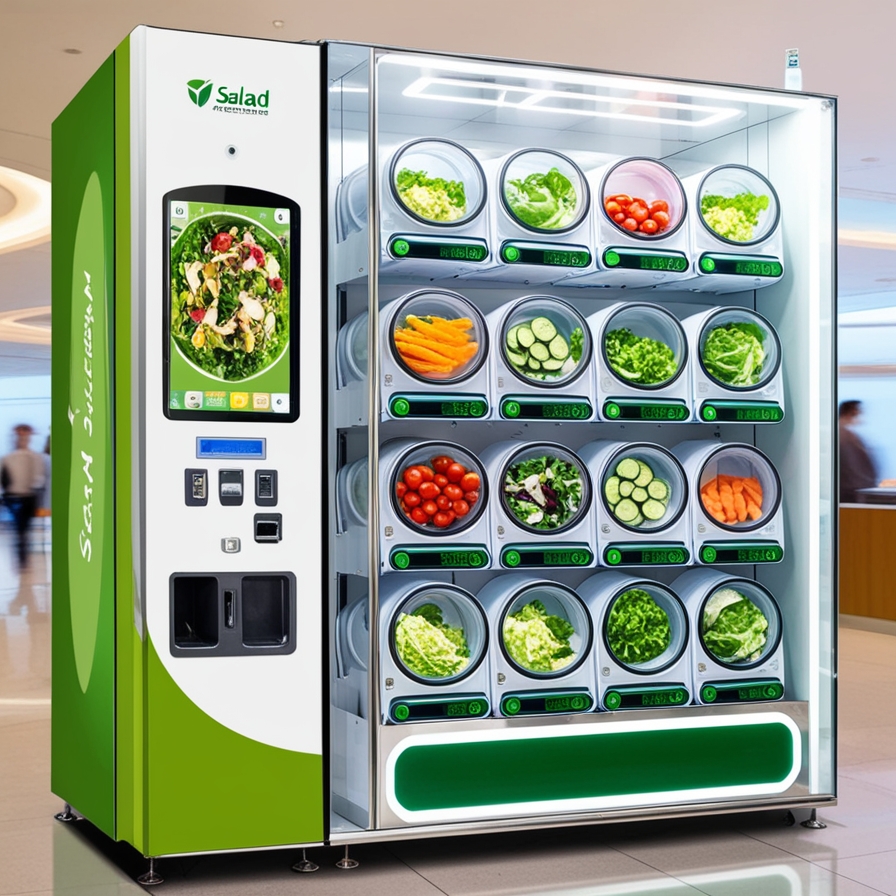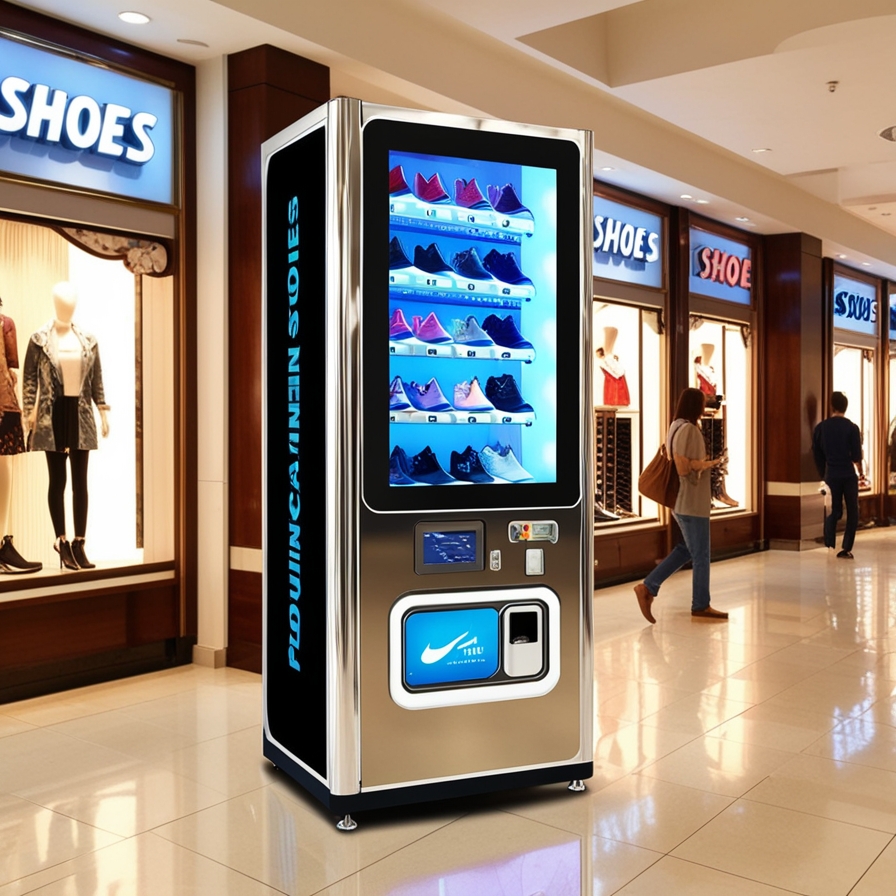Embracing Innovation in Vending: The Rise of Solar-Powered Machines
Introduction
In an era where sustainability shapes consumer choices, solar-powered vending machines stand as a testament to innovation. These machines harness solar energy to operate, reflecting a shift towards greener alternatives in the vending industry.
By merging technology with eco-friendliness, they not only offer convenience but also contribute to environmental conservation. This approach not only aligns with global sustainability goals but also meets the growing demand for eco-friendly solutions in everyday life.
As businesses and consumers increasingly prioritize green technology, solar-powered vending machines are becoming more than a novelty—they are a smart step forward in the eco-conscious market.
What are Solar-Powered Vending Machines?
Harnessing the Sun’s Power for Convenience
Solar-powered vending machines are innovative devices that operate using energy harnessed from sunlight. These machines are equipped with solar panels that convert solar energy into electrical power, eliminating the need for traditional electricity sources. This makes them not only eco-friendly but also versatile for placement in diverse locations without grid power.
Varieties of Solar Vending Solutions
The market offers various types of solar-powered vending machines to cater to different needs. The standard solar vending machine is designed for general snacks and beverages, while the brightbox machine specializes in tech-oriented products, such as charging batteries and electronic accessories. Each type brings a unique aspect to solar-powered vending, providing options that go beyond mere refreshments to include valuable services in high-demand areas.
How Do Solar-Powered Vending Machines Work?
The Mechanics of Solar Energy in Vending
Solar-powered vending machines operate through a seamlessly integrated system of solar panels and energy storage. These panels, typically mounted on the top or sides of the machine, absorb sunlight and convert it into direct current (DC) electricity. The DC electricity is then either directly used to power the machine or stored in batteries for use during periods without sunlight.
From Sunlight to Snack: A Step-by-Step Process
- Solar Panel Absorption: The solar panels capture solar energy.
- Energy Conversion: A connected inverter converts the DC electricity into alternating current (AC), suitable for appliance use.
- Power Management: Energy management systems regulate the flow of electricity, ensuring the machine operates efficiently and the batteries are charged without overloading.
- Storage and Usage: Excess energy is stored in batteries, providing a continuous power supply even on cloudy days or during nighttime operations.
Visualizing the Process
To aid in understanding, visual aids like diagrams or infographics can be extremely helpful. They can illustrate the flow of electricity from the panels to the machine, showing the conversion processes and energy storage. This visual component not only enhances comprehension but also engages readers who might be new to the concept of solar energy applications in everyday technologies.
The Evolution of Solar Machines in Retail
Tracing the Roots of Solar-Powered Innovation
The journey of solar machines in the retail sector began as an ambitious endeavor to integrate renewable energy into everyday commerce. Over the past few decades, these machines have evolved from mere prototypes to sophisticated systems capable of operating entirely on solar power. This evolution reflects a broader shift in retail towards sustainability and technological integration.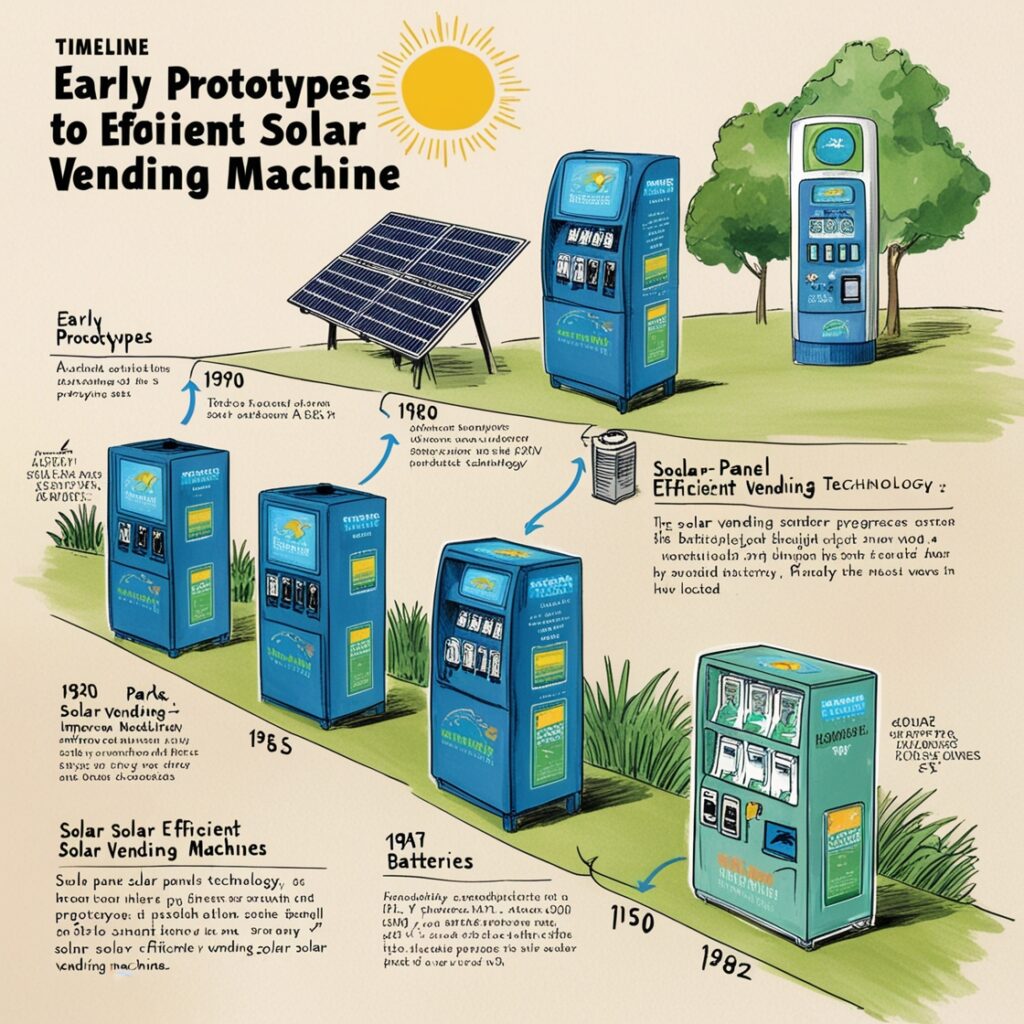
Milestones in Solar-Powered Machine Development
Early models of solar-powered vending machines were primarily experimental, used as proofs of concept to showcase the viability of solar energy in small-scale retail operations.
These units were often limited by technology and climate, functioning optimally only in areas with abundant sunlight.
However, advancements in photovoltaic technology and energy storage have expanded their usability across diverse environments.
Engoplanet Energy Solutions LLC: A Pioneer in Solar Retail Technology
A key player in this evolution is Engoplanet Energy Solutions LLC, a company that has been at the forefront of designing and implementing solar-powered solutions in retail.
Their innovations include high-efficiency solar panels and smart energy management systems that optimize power use and increase the operational reliability of solar vending machines.
Engoplanet’s contributions have not only propelled the technology forward but have also demonstrated the commercial viability and environmental benefits of solar-powered retail solutions.
Today’s Solar-Powered Vending Machines
Today, solar vending machines are more than just a niche product; they are a practical solution for reducing energy costs and carbon footprints in the retail sector.
Their ability to operate independently of the electrical grid makes them particularly appealing in remote or underserved areas, thus expanding the reach of various products.
The ongoing advancements in solar technology promise even greater efficiency and broader applications, continuing the transformative impact of solar energy in retail.
Is a Solar-Powered Vending Machine More Profitable?
Evaluating the Financial Benefits
The profitability of solar-powered vending machines compared to their traditional counterparts hinges on several economic factors, including initial investment, ongoing maintenance costs, and the overall revenue generated by sales.
Initial Investment: Solar vs. Traditional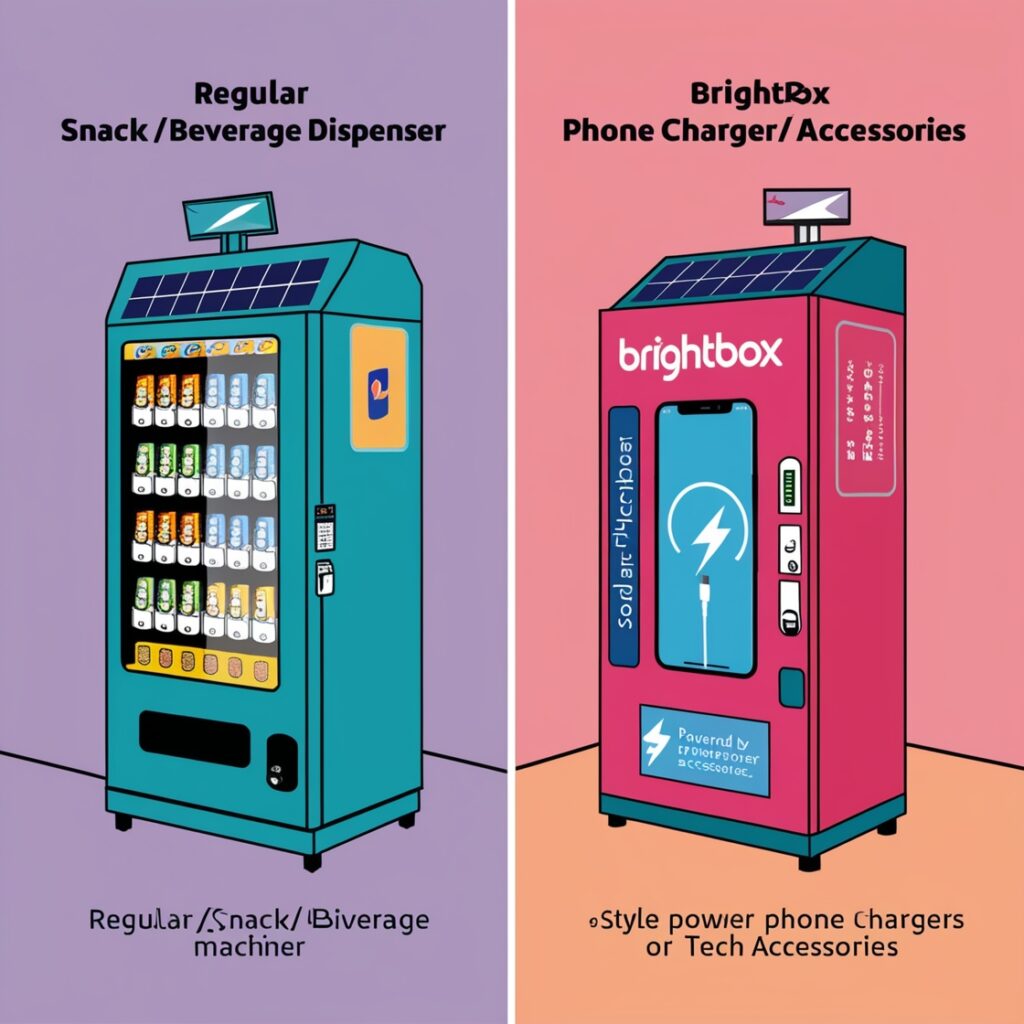
Solar-powered vending machines typically require a higher initial investment than traditional machines. This is due to the added cost of solar panels and the associated energy storage systems. However, this initial cost can be offset by various incentives such as tax credits, grants, and rebates offered for renewable energy installations, making the upfront expense more manageable.
Ongoing Maintenance and Operating Costs
One of the most significant advantages of solar-powered machines is the reduction in operating costs. These machines eliminate the need for electrical utility expenses, as they rely solely on solar power. Additionally, solar equipment generally requires less maintenance than electrical systems, which can further reduce long-term costs.
Revenue Comparison and Break-even Analysis
To determine the profitability, a break-even analysis is essential. For solar-powered vending machines, the break-even point may be reached quicker due to lower daily operating costs. The revenue from sales remains consistent with that of traditional machines, assuming similar traffic and purchase rates. Therefore, after surpassing the break-even point, solar-powered machines can potentially yield higher net profits.
Long-term Returns and Sustainability
The long-term financial returns of solar-powered vending machines also include the sustainability aspect. With increasing awareness and preference for eco-friendly products among consumers, solar-powered machines can attract a larger customer base, potentially increasing sales revenue.
Moreover, businesses can leverage their use of renewable technology for marketing purposes, enhancing brand image and customer loyalty.
while the upfront costs of solar-powered vending machines are higher, their long-term profitability is enhanced by lower operating costs, potential sales benefits from eco-conscious consumers, and marketing advantages. This makes them a viable and often more profitable option for vendors willing to invest in sustainable technology.
Daily Electricity Usage of Traditional Vending Machines
Understanding Energy Consumption in Conventional Vending
Traditional vending machines, which typically operate continuously around the clock, can consume a significant amount of electricity. On average, a standard vending machine uses approximately 3,000 to 4,000 kilowatt-hours (kWh) of electricity per year. This translates to about 8 to 11 kWh per day, depending on the machine’s size, the type of products it dispenses, and its location.
Comparing Energy Usage with Solar-Powered Machines
Solar-powered vending machines present a stark contrast in terms of energy consumption. Since they rely on solar energy, the direct electricity usage from conventional power grids is virtually zero. The primary energy consumption occurs during the manufacturing and initial setup of the solar panels and battery systems. Once operational, these machines harness and store solar energy, eliminating the daily electricity costs associated with traditional vending operations.
Emphasizing the Energy Savings
The shift from a traditional to a solar-powered vending machine can lead to substantial energy savings. For instance, if a traditional machine consumes 10 kWh per day, switching to a solar-powered machine could save approximately 3,650 kWh annually, considering the machine operates every day. These savings not only reduce operational costs but also contribute significantly to environmental conservation by lowering carbon emissions associated with electricity generation from non-renewable sources.
The Financial Impact of Reduced Energy Use
The reduction in energy consumption translates directly into cost savings. With the average cost of electricity per kWh being around 10 to 12 cents, the annual savings from using a solar-powered vending machine can range from $365 to $438. Over the lifespan of the machine, these savings can cover the initial higher investment costs and contribute to overall higher profitability, making solar-powered vending machines an economically and environmentally sound choice in the long run.
Benefits of Solar Vending Machines
Advantages of Going Solar in Vending
Solar-powered vending machines offer a myriad of benefits that extend beyond financial savings, contributing positively to environmental and societal goals. Here are some key advantages:
- Lower Energy Costs: As previously discussed, solar vending machines operate on power generated by solar panels, significantly reducing or even eliminating the electricity costs associated with traditional vending machines.
- Reduced Carbon Footprint: By utilizing renewable solar energy instead of electricity derived from fossil fuels, these machines help reduce greenhouse gas emissions. This is a crucial step towards mitigating climate change and promoting environmental sustainability.
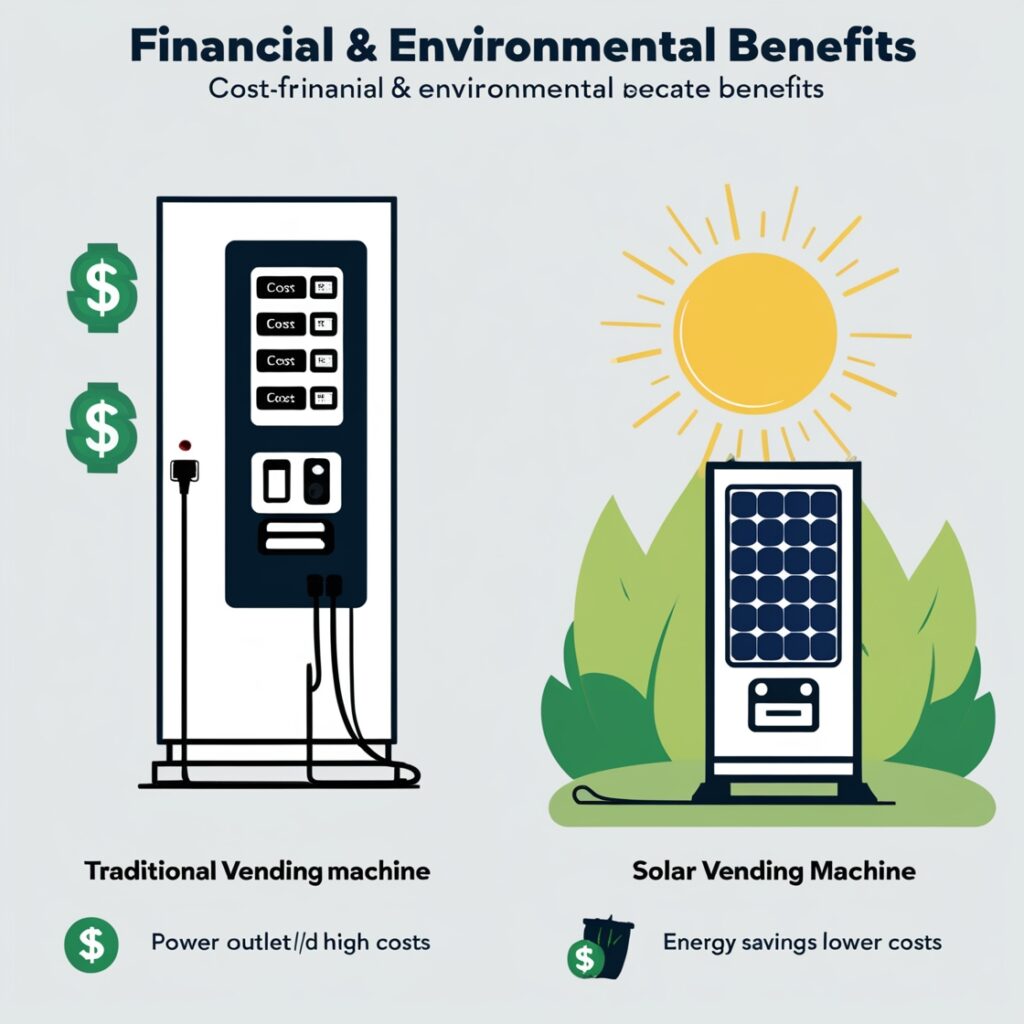
- Government Incentives: Many regions offer incentives such as tax breaks, subsidies, and rebates for the adoption of solar technologies. These incentives can help offset the initial cost of solar-powered vending machines and accelerate the return on investment.
Implementing Solar Vending Machines Effectively
To maximize the benefits of solar-powered vending machines, certain steps should be considered:
- Site Assessment: Conduct a thorough evaluation of the proposed locations for solar vending machines to ensure adequate sunlight exposure throughout the year. This involves considering geographic and architectural factors that may influence solar gain.
- Right Sizing: Choose the appropriate size and type of solar panel system and battery storage to match the energy needs of the vending machine. This ensures efficient use of the generated solar power and minimizes waste.
- Opt for High-Quality Solar Equipment: Invest in high-quality solar panels and batteries that offer higher efficiency and longer durability. This might involve a higher upfront cost but leads to better performance and longer service life.
- Regular Maintenance: Implement a routine maintenance schedule for the solar panels and vending machine components. Keeping the solar panels clean and free from obstructions like shade or debris is vital for maintaining optimal energy production.
- Leverage Incentives: Take full advantage of government and local utility incentives to reduce initial costs. This can involve conducting research or consulting with experts on available benefits in your area.
- Public Awareness and Branding: Use the solar-powered aspect of the vending machines as part of your marketing strategy. Educate customers about the environmental benefits of supporting solar-powered vending services, which can enhance corporate image and customer loyalty.
By following these steps, businesses can effectively implement solar vending machines, reap financial benefits, contribute to environmental sustainability, and enhance their brand’s value and appeal in a competitive market.
DIY Solar Vending Machine Projects
Building Your Own Solar-Powered Vending Machine
Creating a solar-powered vending machine can be a rewarding project for those interested in renewable energy and technology. This DIY guide will walk you through the necessary steps, tools, and considerations to convert a standard vending machine into a solar-operated one.
Step-by-Step Guide to Setup
Select a Vending Machine: Choose a suitable vending machine that fits your product needs and available space. It should have an accessible electrical setup that can be easily modified for solar power.
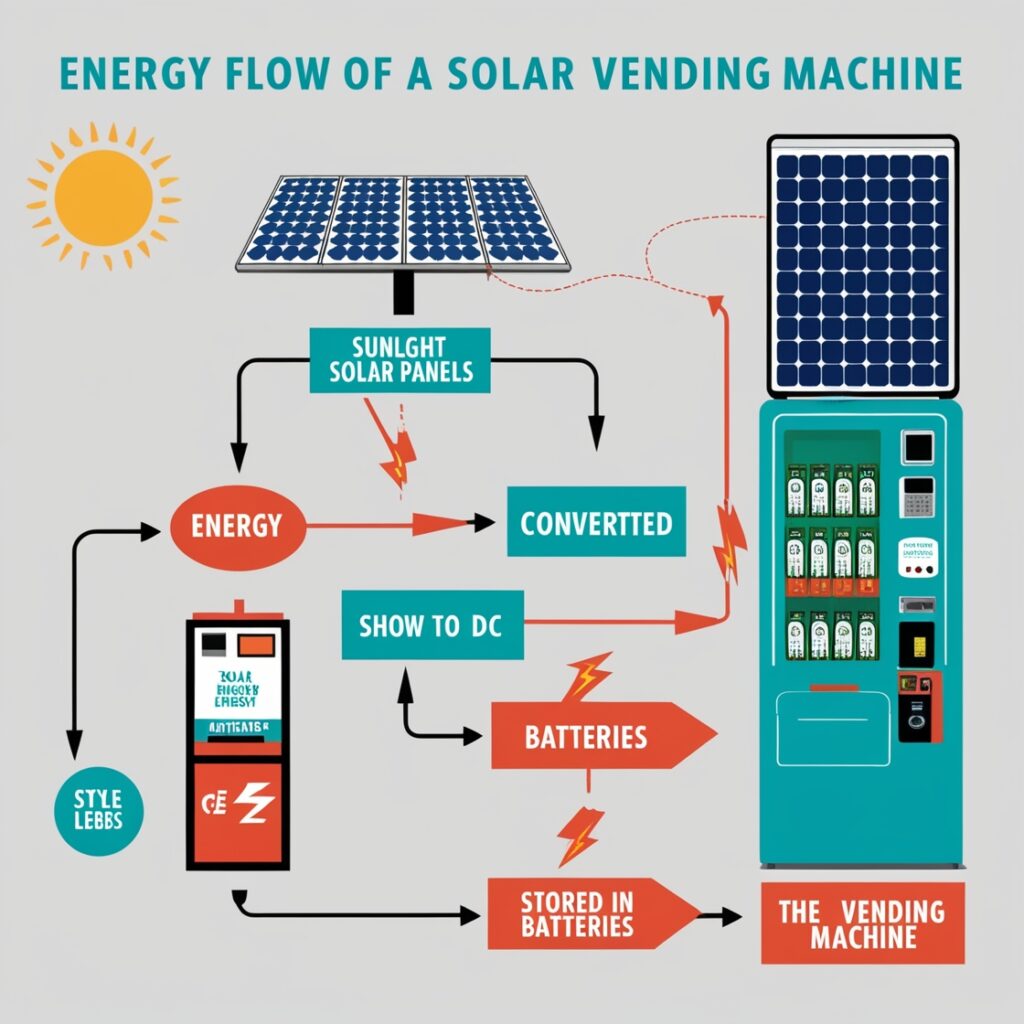
- Acquire Solar Panels and Accessories:
- Solar Panels: Depending on the machine’s power requirements, purchase appropriate solar panels. Panels with a higher wattage will generate more power.
- Charge Controller: Essential for regulating the voltage and current coming from the solar panels to the battery.
- Battery System: Get a high-capacity battery to store the solar energy for continuous and nighttime operation.
- Inverter: Converts DC electricity from the solar panels and batteries into AC electricity used by the vending machine.
- Tools and Materials:
- Basic electrical tools (wire cutters, screwdrivers, multimeter)
- Mounting equipment for solar panels
- Wiring and connectors specifically designed for solar setups
- Safety gear (gloves, goggles)
- Installation Process:
- Install the solar panels in a location with maximum sunlight exposure. Ensure they are securely mounted and angled to receive optimal sunlight throughout the day.
- Connect the solar panels to the charge controller, then connect the controller to the battery. From the battery, connect to the inverter, and finally, link the inverter to the vending machine.
- Test the connections with a multimeter to ensure everything is properly wired and the system is functional.
- Configure and Test:
- Once all components are connected, check the system during different times of the day to ensure consistent power supply and performance.
- Adjust the tilt and positioning of the solar panels seasonally to maximize solar capture and efficiency.
Recommended Solar Panel Brands and Resources
For reliability and efficiency, consider investing in solar panels from reputable brands such as:
- LG: Known for high-quality and durable solar products.
- SunPower: Offers some of the most efficient solar panels on the market.
- Panasonic: Well-regarded for producing robust solar panels with high energy conversion rates.
Developing Necessary Skills
Building a solar vending machine requires basic to intermediate electrical skills, such as wiring and understanding electrical diagrams. If you are new to this, consider taking online courses or workshops on solar power systems and basic electronics.
Setting up a solar-powered vending machine as a DIY project can be a practical and educational way to engage with renewable energy technologies. Not only does it provide a hands-on learning experience, but it also contributes positively to sustainable practices and innovation.
Where to Find Solar-Powered Vending Machines
Discovering Locations and Acquiring Your Own
Solar-powered vending machines are increasingly popular in a variety of settings, from university campuses to tourist spots, where sustainability efforts are prioritized. Understanding where these machines are in use and how to get one for your location can expand your operations into eco-friendly vending solutions.
Common Locations for Solar Vending Machines
- Educational Institutions: Universities and colleges are leading adopters, using these machines to reduce campus energy costs and educate students on renewable technologies.
- Parks and Recreational Areas: Many national and city parks have installed solar vending machines to offer visitors refreshments without the need for grid power, preserving the natural aesthetics and environment.
- Business Campuses: Forward-thinking companies install these machines to support sustainability initiatives and provide employees with convenient access to snacks and drinks.
- Tourist Attractions: Locations like zoos, museums, and historical sites use solar-powered vending machines to enhance the visitor experience in an eco-friendly manner.
Purchasing or Leasing Solar Vending Machines
- Manufacturers and Suppliers: Several companies specialize in solar-powered vending solutions. Engoplanet Energy Solutions LLC is a notable example, offering a range of solar-powered machines designed for various applications.
- Trade Shows and Expos: Attending industry trade shows such as the National Automatic Merchandising Association (NAMA) Show provides opportunities to see the latest technologies in person and meet directly with suppliers.
- Online Marketplaces: Platforms like Alibaba and industry-specific online stores often list solar vending machines for purchase or lease, providing options to compare different models and prices.
Leasing Options
Many suppliers offer leasing arrangements, which can be an excellent way to reduce upfront costs while still deploying solar vending machines. Leasing can also include maintenance plans, ensuring that machines remain operational without additional costs for repairs or upgrades.
Installation and Support
When purchasing or leasing, it’s important to discuss installation support. Many suppliers provide comprehensive installation services, ensuring that the solar panels and vending machines are correctly set up and optimized for the specific location’s sunlight exposure.
Finding the Best Solar Panel Brands
Selecting Top-Tier Solar Technology
For those venturing into solar-powered vending machines, choosing the right solar panel brand is crucial for maximizing efficiency and durability.
Here’s a look at some of the leading brands in the solar panel industry, known for their high-quality products and reliability:
- LG: Established in 1958, LG is a powerhouse in electronics and extends its expertise to solar technology. LG solar panels are known for their high efficiency and robust warranties, making them a popular choice for commercial applications. LG is heavily favored in countries like the USA and South Korea, with annual sales reaching into the billions, indicating their widespread acceptance and trust in the market.
- SunPower: Founded in 1985, SunPower stands out with its high-efficiency solar panels, which are some of the best on the market. Their panels are particularly suited for spaces where efficiency per square foot is crucial, such as on vending machines. SunPower is highly recommended for solar vending applications due to its panels’ ability to produce more power in limited spaces, with significant usage in the United States and parts of Europe.
- Panasonic: Since 1918, Panasonic has built a reputation for durable and high-performance technology. Their solar panels are designed to perform well even under challenging conditions, ensuring consistent energy production. Panasonic’s solar solutions are ideal for regions with less consistent sunlight, making them a practical choice for vending machines worldwide.
- Canadian Solar: Established in 2001, Canadian Solar stands as one of the largest solar technology companies globally. Known for its strong annual sales figures, often exceeding several gigawatts in solar panel shipments, Canadian Solar provides competitively priced yet high-quality panels suitable for a wide range of applications, including vending machines.
- First Solar: Founded in 1999, First Solar specializes in thin-film solar panels, ideal for hot climates and low-light conditions. Their technology is particularly advantageous for vending machines in diverse geographic settings, making them a top choice for areas with fluctuating or harsh weather conditions.
Additional Recommendations:
- Jinko Solar: As one of the world’s largest solar panel manufacturers, Jinko Solar, established in 2006, offers high-output panels that are cost-effective and widely used across various markets, including the Americas and Asia. Their robust manufacturing capabilities ensure reliability and affordability.
- Qcells: Founded in 1999, Qcells has emerged as a leader in the solar industry, particularly known for its innovation and quality. They are a preferred choice in markets like Germany, the USA, and South Korea, with their technology well-suited for high-efficiency applications in solar vending.
- Silfab Solar: Silfab Solar, with manufacturing expertise in North America since 2010, focuses on monocrystalline silicon technology, delivering panels with excellent efficiency and durability, making them ideal for North American climates.
- Mission Solar: Based in the USA and operational since 2014, Mission Solar produces panels that perform exceptionally well under high temperatures and are perfect for solar vending machines in sun-rich states across the US.
Factors to Consider
When selecting a solar panel brand, consider the following factors:
- Efficiency: Higher efficiency panels produce more electricity from the same amount of sunlight, which is beneficial for limited space applications.
- Durability: Look for panels that can withstand environmental stresses such as wind, rain, and temperature fluctuations.
- Warranty: A longer warranty period indicates the manufacturer’s confidence in their product, which can provide peace of mind.
- Cost: Balance the upfront cost with the expected energy production and long-term savings to ensure the best return on investment.
